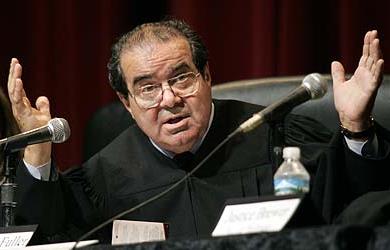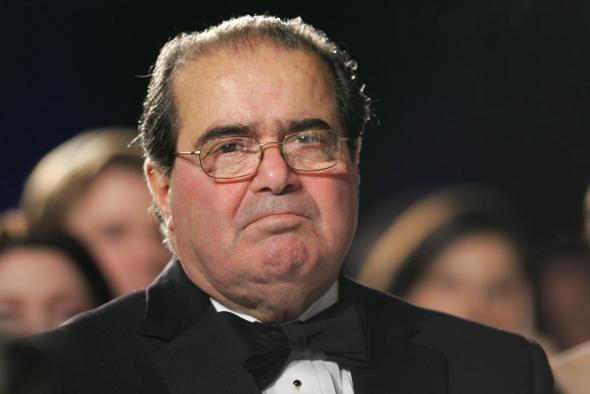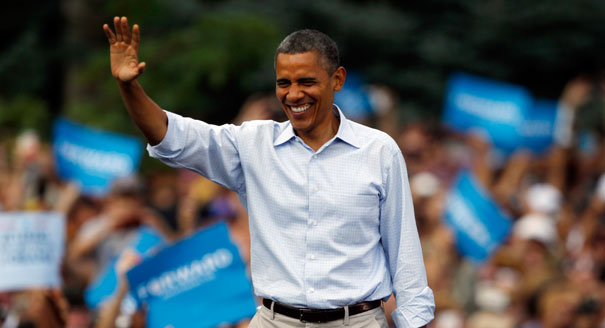It didn’t take long for Republicans to admit that their purportedly principled vow to block anyone President Obama nominates to the Supreme Court to replace the late Justice Antonin Scalia is all about politics.
Just minutes after the news broke of Scalia’s death, many Republican politicians and conservative activists said that the Senate should refuse to hold any hearings or votes on whomever Obama nominates to replace him because it is an election year.
Donald Trump and Ben Carson have both admitted that if they or another Republican were in the White House, they would have no problem with filling the vacancy. Different rules, it seems, apply to President Obama.
This admission undermines the GOP’s entire argument that they are simply abiding by a nonpartisan tradition of refusing judicial confirmations in election years, an assertion also contradicted by past statements from Senate Republicans such as Judiciary Committee Chairman Chuck Grassley, who said in 2008 that “the reality is that the Senate has never stopped confirming judicial nominees during the last few months of a president’s term.”
Before the president has even hinted at his choice to replace Scalia on the court, Republicans have been busy concocting bogus “traditions” and other excuses for obstruction — all in an effort to hide the partisan motivations behind keeping Scalia’s seat open.
5) It’s A Tradition!
Several conservatives have been pushing the easily debunked claim that the Senate never confirms a nominee to the Supreme Court during an election year.
Marco Rubio said on Meet the Press that “it’s not just for the Supreme Court, even for appellate courts, both parties have followed this precedent. There comes a point in the last year of the president, especially in their second term, where you stop nominating, or you stop the advice and consent process.”
Rubio’s claim was demonstrably false, but he wasn’t alone in making it.
During Saturday’s GOP presidential debate, moderator John Dickerson called out Ted Cruz for saying that “we have 80 years of precedent for not confirming a Supreme Court justice in an election year,” noting that Justice Anthony Kennedy was in fact confirmed in 1988, Ronald Reagan’s final year in office. Cruz responded that “Kennedy was confirmed in ’87,” which is simply untrue. (The audience booed Dickerson for saying he “wanted to get the facts straight for the audience.”)
Cruz’s father, Rafael, took it one step further, telling Pat Robertson that “if the Democrats want to appoint somebody, let them win the election,” seeming to forget that President Obama was elected for a full term in 2012 and that the drafters of the Constitution didn’t want Supreme Court appointments put up to a popular vote.
4) Chuck Schumer Said…
Conservative activists have seized on remarks that Sen. Chuck Schumer made in 2007, which they claim prove that the New York Democrat favored blocking any Supreme Court justice nominated by George W. Bush in case of a vacancy in his last year in office.
However, this line of attack conveniently ignores a key part of Schumer’s speech, where he said that Democrats would only oppose a far-right judicial nominee, explaining that “they must prove by actions not words that they are in the mainstream rather than we have to prove that they are not.”
Josh Marshall of TPM notes that conservatives are misreporting the content of Schumer’s speech:
Schumer quite explicitly never said that the Bush shouldn’t get any more nominations. He also didn’t say that any nominee should be rejected. He said they should insist on proof based on judicial history, rather than just promises that they were mainstream conservatives rather than conservative activists, which both have proven to be. But again, set all this aside. He clearly spoke of holding hearings and being willing to confirm Bush nominees if they met reasonable criteria.
3) What About Robert Bork?
In defense of their stance that Republicans should refuse to consider any Obama Supreme Court nominee, some conservatives have cited the 1987 fight over Robert Bork’s nomination to the Supreme Court, which they offer as proof that Democrats have done the same thing in the past.
This is an odd case to bring up, seeing that Bork did in fact receive a fair hearing and a vote on the Senate floor, two things many Republicans today say should not be given to a future Obama pick.
Bork was voted down by a bipartisan majority of senators due to his extremist views, particularly his hostility to civil rights laws, which is a completely different matter than flatly refusing to hold committee hearings or a vote on a nominee.
2) Obama Is Packing The Court!
Carrie Severino of the Judicial Crisis Network, a conservative group that, ironically, was previously named the Judicial Confirmation Network, told the Washington Post on Monday that “if the president tries to pack the court, as it is apparent he may, then JCN will be leading the charge to delay a Senate vote until the American people decide the next president.”
“Obama doesn’t give a crap about the Constitution…he sees an opportunity to pack the court,” conservative radio host Mark Levin said. “Obama wants to pack the court. That’s what he wants to do on the way out the door and he must be prevented.”
Simply fulfilling his constitutional duties to fill a vacancy in the court following a jurist’s death is not an attempt to “pack” the court. Court packing is when an official tries to expand the current size of the court or create new courts in order to appoint new judges without waiting for vacancies.
1) Obama Has A ‘Conflict Of Interest’
Sen. Rand Paul, who styles himself as a constitutional scholar, said he is uncomfortable with President Obama appointing anyone to the bench because the Supreme Court is considering cases involving Obama’s executive orders on issues like immigration and environmental regulation.
Therefore, Paul concludes, Obama “has a conflict of interest here in appointing somebody” to the court.
The Kentucky Republican’s logic that a president shouldn’t be allowed to make judicial nominations because they may have to rule on actions of the executive branch is absurd on its face. The Constitution provides the president the power to do just that and, if Paul’s logic were to be applied, no president would be able to make any nominations at any time in office.
According to this argument, senators would similarly have a “conflict of interest” in voting to confirm Supreme Court justices since a future justice would likely decide on the constitutionality of laws passed by Congress.
Paul’s bizarre assertion that presidents shouldn’t be allowed to appoint justices due to a possible “conflict of interest” merely speaks to how desperate the GOP has become in trying to come up with dubious arguments that will make their proposed blockade seem like a principled stance, rather than what it really is: a brazenly partisan endeavor that will allow them to shirk their constitutional responsibilities.








